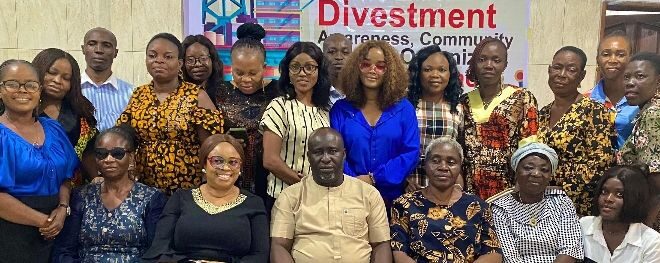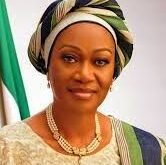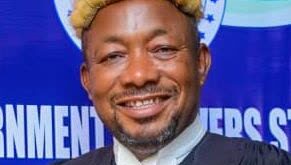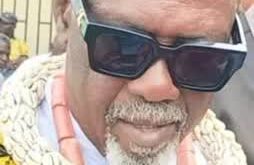By Kelechi Nwaucha
The role of women in defending and furthering the rights of communities, especially in the light of onshore divestment by international oil companies and legacy pollution issues, last Friday formed the basis of an awareness creation program organized by Olegh Centre for Community Development for community women in Rivers State.
Tagged, ‘Divestment Awareness, Community Women Organizing and Advocacy,’ and organized with support from Both ENDS, the event brought together community women from Rumuekpe (Emohua LGA), Umuechem (Etche LGA), Obelle, Ibaa and other oil bearing communities and local government areas in the state.
Executive Director of Olegh Centre for Community Development, Henry Eferegbo, said “the program is targeted at creating awareness for community women on issues of divestment, and community women organizing to protect their environment.
“Women are highly impacted in oil operation activities and the legacy of pollutions in the Niger Delta. This is because they play more with the environment.
“So we need to create awareness, to sensitize them to know the dangers associated with these pollutions. We also want to amplify the voices of others in the Niger Delta. And encourage the women to join suit by advocating and raising issues and questions on divestment,” he said.
Eferegbo lamented the level pollution and degradation in the Niger Delta, adding that “If all of us, together, continue to ask pertinent questions and then raise issues where necessary, the international community, policy makers and regulators, even the divesting companies and people with conscience, will be disturbed to do the right thing.
“Even the companies that are buying (the divested entities) will also know that if they are to buy, they must ensure that all the liabilities are documented. And they should specify on time with target on when to start implementing and executing on those liabilities.
“Otherwise, if we leave the environment the way it is, in the near future, ten years from today, we may not predict what will happen to the people of the Niger Delta. We foresee danger coming, because the water is already polluted, the fishes are dying and extinct. The ecosystems are altered. And that’s why probably a lot of people are dying early.
“So we are saying let the environment be restored, such that life can come back,” he said.
Eferegbo noted that there is need for women to play more active role for environmental justice in the Niger Delta, since the men are easily branded as trouble-makers. “The women are better suited. Because if the men begin to agitate, even in a non-violent manner, sometimes the society labels them differently,” he said.
Resource person at the event, Chief Constance Meju, who is also publisher of the National Point Newspaper, said “women are clearly absent in a lot of things in Nigeria basically because of our tradition. And that tradition has been responsible also for the poor educational level of many women the poor economic status of women and the near absence of women in the political arena and decision-making positions.
“Now we are talking about divestment, and in Nigeria, the real people who use the environment who use the land and do the fishing are women. It is their duty to put food on the table. The more than 5 decades of oil exploration has robbed them of that value because many are not able to feed their families anymore.
“So now having destroyed the environment the oil companies are moving out and are not even negotiating with the communities and even when they do the women are not even part of it.
“So there is need for the women to be trained to demand what should be theirs. They need to know that together you can raise your voice get a strong voice and become a force in your community pushing for development and also letting the world know what is happening.
“Today is all about creating that awareness for them and also encouraging them to form groups, identify the critical issues in their community, then begin to address them one by one,” Chief Meju said.
Professor Fidelis Allen, of the University of Port Harcourt, who was present at the event, said “Women have always faced the problem of walls created by men. So women have to create a pathway to be able to make impact in the communities that they found themselves.”
He said that “By engaging with relevant authorities, they will be telling the authorities the problems that they actually face. And often these problems are associated with their well-being, and the well-being of their children and their livelihoods.
“So it’s very important that the women are involved in peace building processes. It will help them to achieve their desires, for instance, of having their children given jobs, and all of those things that they are asking for,” Professor Allen said.
He added that, “For the environment that has been polluted, peace for these women would actually mean restoration of sources of livelihoods, health care for the health consequences of pollution that they’ve had to face. So when you talk about peace in this context, you’re talking about justice, environmental justice.”
One of the community women, from Rumuekpe in Emohua Local Government Area, Mrs Blessing Orijos, said “I’ve learned the meaning of divestment. I’ve gotten the idea that Shell is divesting and selling their shares. So if they are going, they should rebuild our land. At least I have the idea that the share is moving.
“I’ve gotten another idea that as they are going, we should hold them responsible for what they have destroyed. The liability they have caused to the land.
“Olegh has given me knowledge, to go and mobilize the women. To tell them that this is what Shell is about to do. And they are leaving. Even the cleanup in my community is still there. They did not clean it up. The land is there. The water has been destroyed. Nothing is coming. So how do we do? No light. No health center. Not even hospital. No road. No water. So they are just leaving us with that problem and sickness. Who will cure it?
“The environment is no more conducive for us, especially children. Many of us, from five years now, started having eye problems. Like me now, I have eye problems. From five, twenty, fifty years, eye problems. Everybody, eye problems. That’s what we are having now,” she said.
Patience Ebere, from Ibaa community, said “I am happy I am here because it has really opened my eyes to so many things I thought wasn’t possible. Like now giving us the idea of going back home there to gather women.
“Even though we come from hostile communities where men are domineering and women we don’t have a voice. But with what I’ve learned today we know how to gather women and know how to approach men as to see how women could be included in whatever they are doing and also to make women understand that they have a voice that if they come out to speak that the world will hear, people will listen,” she said.
Commenting on the level of pollution in her community, Ebere, among other issues, said “In my village we are known for garri and yam. You find out now that garri is becoming expensive, because when you go to farm you don’t have much. The soil was soaked with (crude) oil mixed with water.”
 PH Mundial – Port Harcourt Online Newspaper News Across The Region
PH Mundial – Port Harcourt Online Newspaper News Across The Region





